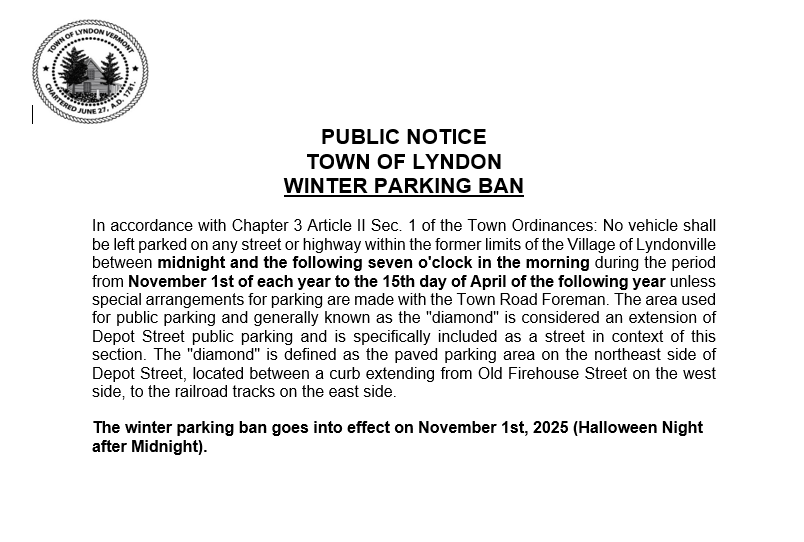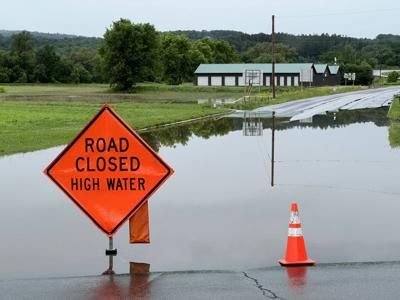Lyndon – Gateway to the Northeast Kingdom
How can we help you?
Welcome to Lyndon!
Town NEWS:

LYNDON RESIDENTS ONLY
Please note that beginning on January 2, 2026 we will have a new way for you to stay informed with important Town news and updates with a text message alert. Some residents will receive a welcome text on or around December 29th.
If you don’t receive the initial message, you can choose to opt-in by texting the keyword “LYNDON” to the number 91896. After sending the initial keyword, you will be asked to reply “YES” to confirm opt-in. Residents may receive notifications for events, Election Information, Office Closures etc. For specific text alerts, text one of the following keywords to the number 91896:
- General notifications: text LYNDON to 91896
- Election notifications: text LYNDONELECTIONS to 91896
- Holiday Closure notifications: text LYNDONHOLIDAYS to 91896
For more information please go to the top of the homepage and check out the TextMyGov page under Community Resources.
You can also sign up through the widget on this page directly to the right ⇒⇒⇒⇒⇒⇒ ⇒⇒⇒⇒⇒⇒

The Town Offices will be closed on Thursday, December 25th & Friday, December 26th for the Christmas Holiday. We will reopen at 7:30am on Monday, December 29th.
Have a safe and happy holiday.
2026 Vacancies
Current Vacancies for 2026
The following positions are open as follows:
Selectboard – (1) 2 year term
Selectboard – (2) 3 year terms
Lister – (1) 3 year term
Cobleigh Library Trustee – (1) 5 year term
Sanborn School Fund Trustee – (1) 3 year term
If you or someone you know is a resident of Lyndon and a registered voter in the Town of Lyndon please come to the Town Clerk’s Office to get a petition. You will need to get 30 valid signatures from Lyndon Voters and return the petition to our office by 5:00pm on Monday, January 26, 2026 to have your name appear on the ballot at Town Meeting.
The following committee vacancies are appointed by the Selectboard.
Therefore, a petition is not required.
- Rep to NEKWMD (one-year term)
- Development Review Board (one-year term)
- Development Review Board (two-year term)
- Green-Up Day Co-Coordinator (one-year term)
- Lyndon Rescue Alternate Rep (one-year term)
- Industrial Park Board (one-year of two-year term)
- RCT Board (one-year term)
- Development Review Board (three-year term)
- Planning Commission (three-year term)
- Communications Union District (CUD) Alternate (1 year term)
Should you have an interest in any of these vacancies please contact Justin Smith at justin@lyndonvt.org or by phone 802-626-5834

Seeking Planning Commission Members:
Are you a Lyndon resident and interested in planning the future of Lyndon? The Planning Commission is seeking several new members. Meetings are held on the 2nd & 4th Wednesdays at 6 PM. If you are interested and want more information contact Tracy Bodeo, Planning Director at (802) 626-3910 or at planning@lyndonvt.org.
Seeking Development Review Board (DRB) Members:
The DRB is seeking two Lyndon residents to fill the board. Meetings are held on the 1st and 3rd Thursdays at 6 PM. If you are interested and looking for more information, contact Jon Prue, Zoning Administrator, at (802) 626-1269 or zoning@lyndonvt.org.

RV Dumping is available again at the Wastewater Treatment Plant at 217 Rose Lane. The cost is $20 per trip and you must call 802-626-5939 to make an appointment. Once the appointment is made you will need to come and make a payment at the Town Clerk’s Office as you will need to bring your payment receipt with you to your appointment.
REAPPRAISAL QUESTIONS ANSWERED
How often is a reappraisal done in the Town/City, and why are we doing one now?
A span between reappraisals creates more opportunity for inequities to grow and usually leads to much larger and unpredictable changes to property values. As inequities increase, the tax burden on individual property owners becomes unfair. Remember that the tax value used for 2025 is the appraised value from the last reappraisal in 2011, or based on any changes since 2011due to permits, grievances, etc. Over the past 14 years, some property values have gone up or down significantly.
Why should I allow a Field Appraiser to enter my property or in my home for the reappraisal?
Part of the reappraisal process is the collection of physical characteristics that include, but are not limited to, square footage of the house, roofing material, exterior siding, land size, number of bedrooms, number of bathrooms, and the quality and quantity of amenities. In addition, the quality of materials in the interior, as well as the condition of the interior helps capture depreciation. Homes that have more depreciation due to fewer upgrades and maintenance may see a decrease in value versus a home that has recent upgrades could see an increase in value.
The data collected during an interior inspection includes the number of bedrooms and bathrooms (considering full bathrooms, three-quarter bathrooms, and one-half bathrooms), and the assessrnent of the condition of the materials within the home, such as ‘flooring, walls, and ceilings. The quality of materials such as kitchen countertops, bathroorn vanity tops, and flooring are also considered. In addition, the type of heating or cooling systems, any finished basement area and foundation data are documented.
The Field Appraiser will gather similar data and information that a real estate agent would when listing a home on the market to sell, as well as similar data and information that a buyer would look for when purchasing a property. The sole purpose is to collect the correct data to assist in providing fair and equitable market value. Additionally, a part of the reappraisal process relies on the analysis of fair market sales that have sold in the past three yean; (years 2023, 2024, & 2025 will be utilized). The sales are analyzed and used as part of the creation of valuation models. Other data considered when creiating valuation models, besides the sales comparison, is market cost and market income. The valuation models are data sets embedded into a CAMA (Computer Assisted Mass Appraisal) system. The property data collected is input into the CAMA system, which generates the new assessments. The system is designed to analyze large volumes of data and can manage diverse property types.
If access to a property is denied, it forces Field Appraisers to base their collection of data from the exterior view only and make educated guesses about the interior features. Even if access to a property is denied, the property will be reassessed based on the best data available. It will not cause the property to be omitted from the reappraisal.
When the reappraisal project is complete, the State of Vermont Property Valuation and Review Tax Department conducts a test to ensure the project complies with the definition of a full reappraisal. One of the stipulations of a full reappraisal includes interior and exterior inspections of properties. Although we cannot force any property owner to give us access to their home and a property owner has the right to deny access, we must follow best practices as stipulated by the state. The purpose of the state’s test is to generate an equalization study, which is used to create a commone level of appraisal (CLA) used in setting education tax rates.
All property owners have the right to appeal the assessed value to the Assessor. If the Assessor denies the appeal, and it goes to the Board of Civil Authority (BCA) at least three (3) memebers of the BCA must inspect the property. If access is denied, it will cause an automatic withdrawal of the appeal (more detailed information about the appeal process is forthcoming as the reappraisal process nears completion).
What is the definition of a market value?
Market value is the most probable price a property would bring in an open and competitive market. The Assessor does not create market value but analyzes the patterns and trends of the local real estate market and uses that information to estimate market values for all properties. Assessors spend a substantial amount of time qualifying all sales used to develop fair market values for property. Automated valuation models, or ‘AVMs’ such as those used by sites like Zillow or Trulia, do not research sales to determine if they meet requirements for qualification. These sites also do no have knowledge of local market variations.
How will a reappraisal impact on what I pay in property taxes?
Property taxes are based on property values. Without poriodic reappraisals, some property owners would pay more while others vvould pay less. Reappraisal resets property values to their current market value so that the property tax burden is equalized for all taxpayers. Reappraisal assures every property owner they are only paying their fair share. However, appraisal and taxation are separate issues. The Assessor determines the market value, and the municipality and state tax rates have no impact on the valuation process. Each taxing authourity establishes its own tax rate. Municipal Tax Rates are set based on the need to raise money for municipality highways and general fund expenses. The municipal rate is levied against the municipal grand list. The Education Tax Rates are based on a homestead education tax rate and a non-homestead education tax rate, which are set annually by the commissioner of taxes. The Education Tax Rates are levied against all homestead and non-homestead parcels on the education grand list. Even if your assessment doubled, that does not mean your taxes would double. Remember the total grand list has changed as well. The tax rate will adjust because of the reappraisal.
I have not made any improvements to my house; how can the value go up or down?
That is because the market has changed since the last reappraisal. The last reappraisal was completed in 2011. At that time, the assessment was established and has not changed since that time. The purpose of the reappraisal is to bring the values established several years ago to current market values and to establish equity across parcels.

